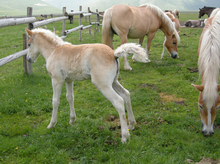Does your horse appear to have a summer cold or summer sores? If so, the cause may be a parasite infestation of either ascarids, also known as large roundworms, or stomach worms, also known as habronema.

Deceptive symptoms caused by parasites in horses
What appears to be a summer cold or summer sores in your horse may be an infestation of worms.
Ascarids, also called large roundworms, are often found in young horses. They can grow to be twelve inches long and can be found in the hundreds in the small intestine, leading to poor nutrition and causing coughing, colic, and diarrhea. If they reach the lungs, they may cause pneumonia.
Large roundworms can cause stunted growth, digestive problems, ruptured gut, and death.
What appears to be a summer cold can be caused by larval stages in the lungs. Usually, foals and young horses are affected by large roundworms, and immunity to these worms develops at about 18 months.
Stomach worms or habronema live in colonies in the wall of the horse's stomach. Eggs that pass in the feces are picked up by flies, which serve as intermediate hosts. When the fly feeds on the wounds or around moist areas of the horse's body, the larvae escape from the mouth parts of the flies and may be swallowed by the horse.
A large number of habronema can produce severe gastritis. Tumor-like enlargements may occur in the wall of the stomach and, if these tumor-like enlargements rupture, peritonitis usually ensues.
In addition to internal problems, habronema cause summer sores and conjunctiva or inflamed, sore eyelids.
Diagnosis of both large roundworms and stomach worms is usually by a fecal egg count.
An on-going parasite control program is the best way to keep equines from suffering the consequences of parasite infestations. If you don't already have a scheduled program, your veterinarian can help you establish one that will work best for your horse.
